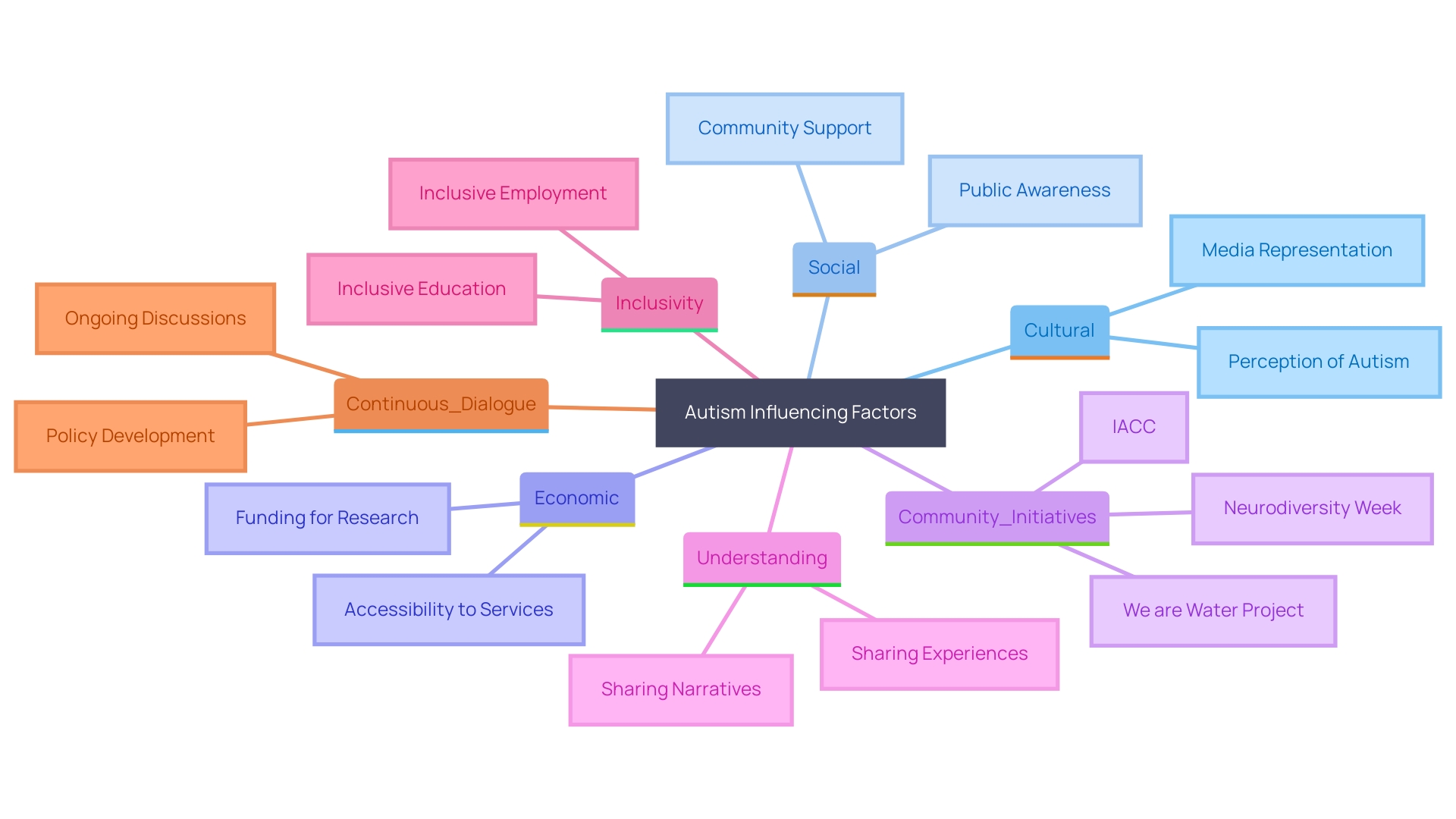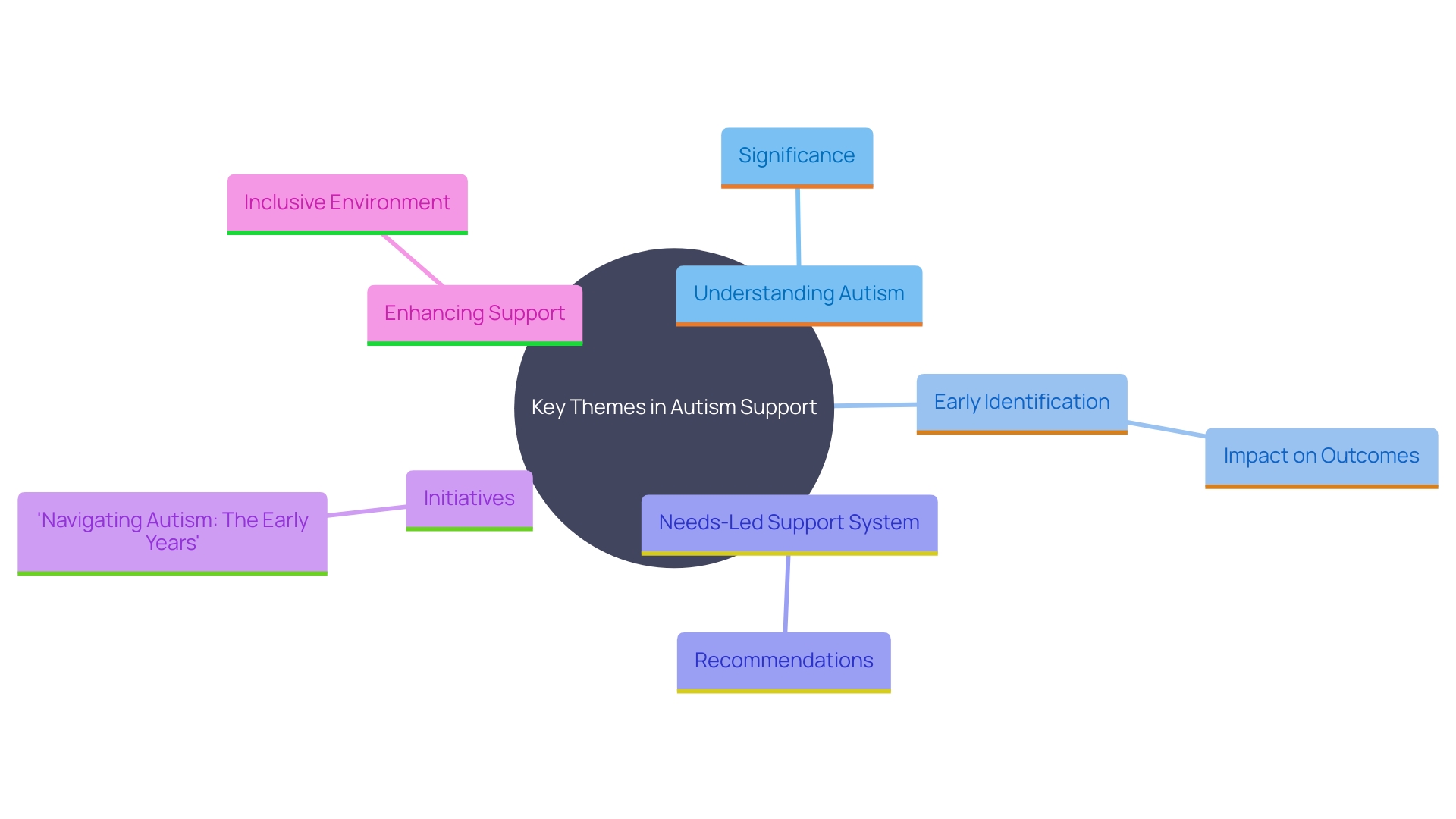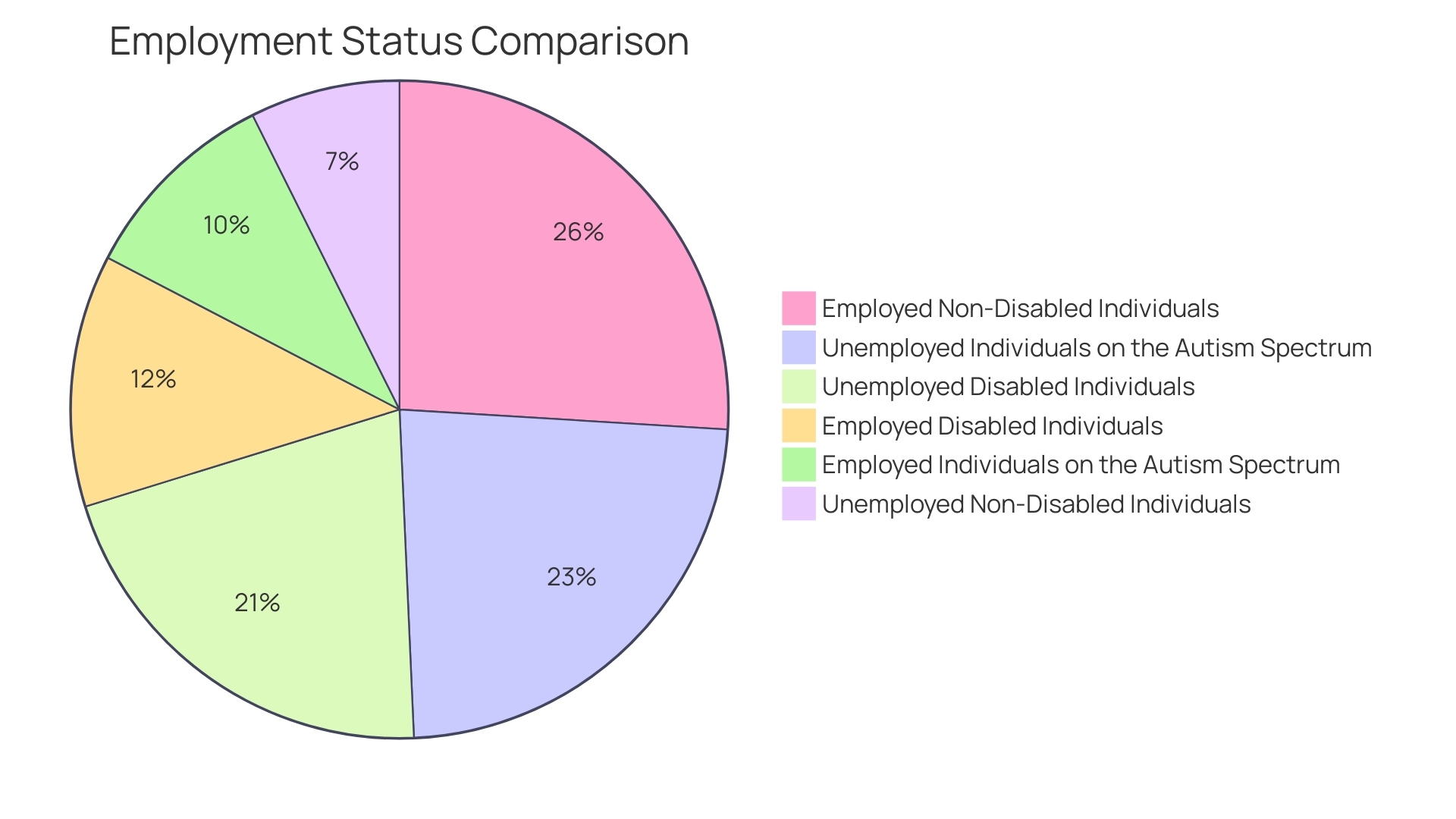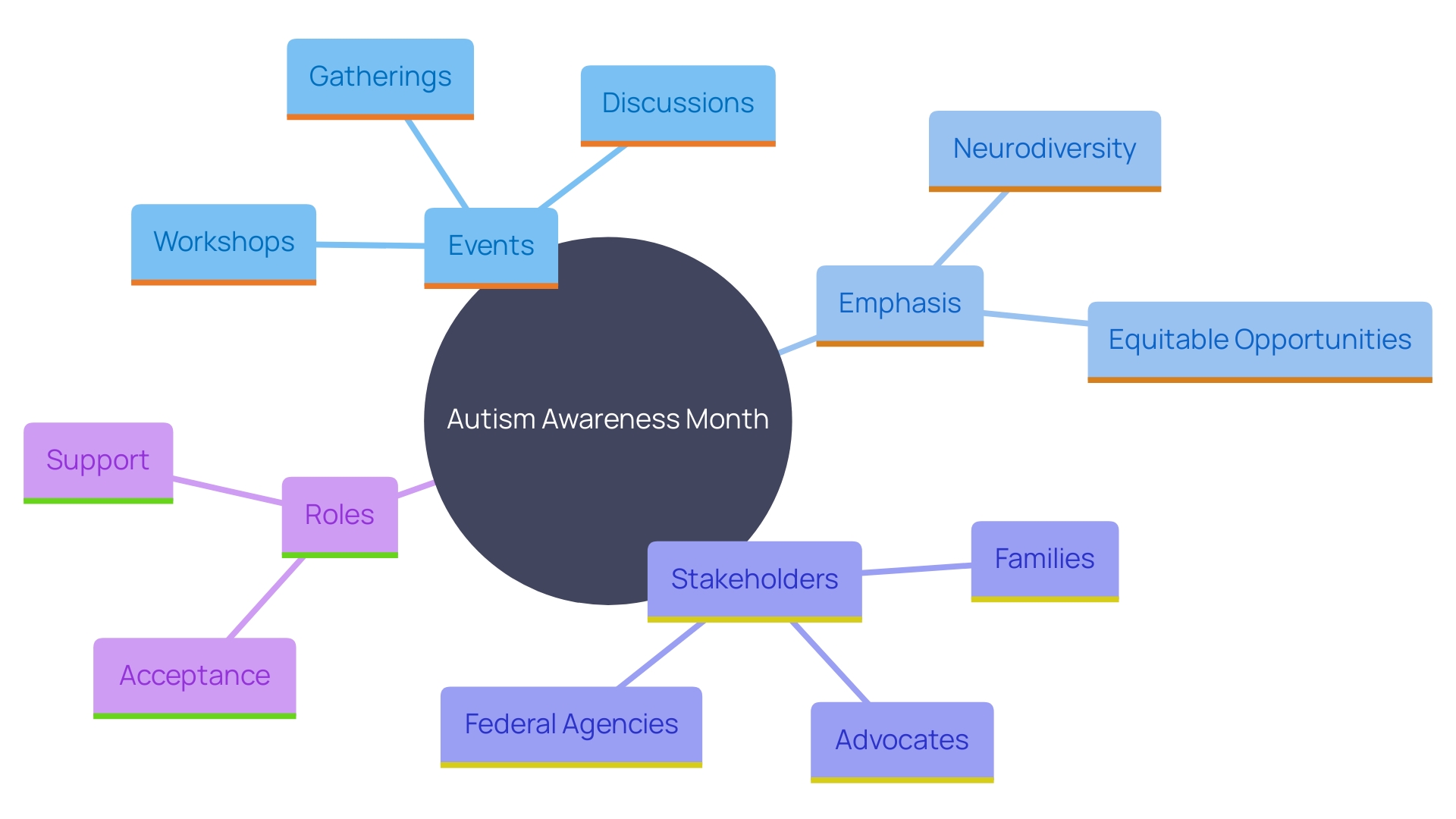Introduction
Autism Awareness Month has undergone a profound transformation from simply raising awareness to fostering acceptance and inclusion. This evolution signifies a crucial understanding that recognizing autism alone is not enough; communities must actively embrace neurodiversity and create environments where individuals with autism are appreciated for their unique perspectives and abilities. Initiatives such as Microsoft’s neurodiversity hiring program highlight the success of inclusive practices, showcasing how they not only provide job opportunities but also cultivate thriving workplaces for neurodivergent individuals.
Understanding autism as a natural variation in brain function, rather than a disorder needing a cure, is fundamental to the neurodiversity paradigm. This perspective celebrates neurological differences as part of the valuable diversity of human minds, advocating for the recognition of the unique strengths that autistic individuals contribute to society. With significant employment gaps still persisting, there is a pressing need for more inclusive hiring practices and workplace accommodations.
Real-world examples like the Autism Welcoming Initiative demonstrate the positive impact of such efforts, promoting broader acceptance and understanding within communities. The shift towards acceptance and inclusion during Autism Awareness Month is essential to ensuring that autistic individuals are not just recognized but truly valued in society.
The Evolution from Awareness to Acceptance
Autism Awareness Month has seen a remarkable transformation over the years. While its initial focus was on raising awareness about the condition, the movement has now evolved to emphasize acceptance and inclusion. This transition signifies a greater comprehension that simply acknowledging this condition is inadequate; communities must actively adopt neurodiversity and strive to build a society where those affected are appreciated for their distinctive viewpoints and talents.
The importance of this paradigm shift is underscored by initiatives such as Microsoft's neurodiversity hiring program, which has successfully brought in about 300 full-time neurodivergent employees. Programs like these not only provide job opportunities but also nurture an inclusive atmosphere where neurodivergent people can thrive.
Understanding autism as a natural variation in human brain function, rather than a disorder requiring a cure, is crucial. As articulated by experts, this perspective is at the heart of the neurodiversity paradigm, which celebrates neurological differences as part of the valuable diversity of human minds. This method dismisses the idea of a sole 'normal' or 'healthy' brain type, promoting the acknowledgment of the distinct strengths, talents, and viewpoints that people on the spectrum bring to society.
Statistics further highlight the need for such inclusive practices. In the UK, only around 3 in 10 working-age individuals on the autism spectrum are employed, compared to 8 in 10 non-disabled people. This significant employment gap underscores the necessity for more inclusive hiring practices and workplace accommodations.
Real-world examples, such as the Autism Welcoming Initiative in MetroWest, which trains and certifies businesses to be more accessible, demonstrate the positive impact of such inclusive efforts. These initiatives not only assist people on the spectrum in navigating public areas more comfortably but also encourage a wider acceptance and comprehension among the population.
In essence, the evolution of Autism Awareness Month towards acceptance and inclusion is a vital step in ensuring that those on the spectrum are not just recognized but truly valued in our society.

Community Perspectives on Autism Awareness and Acceptance
Autism appears differently in diverse groups, influenced by cultural, social, and economic factors. Interacting with local participants—including autistic individuals, families, educators, and advocates—provides a thorough insight into the condition. Exchanging personal narratives and experiences within these groups can greatly improve understanding and appreciation for the various challenges and successes encountered by individuals on the spectrum.
For instance, the Interagency Autism Coordinating Committee (IACC) exemplifies how collaborative efforts can advance research and services related to developmental disorders. Consisting of federal agency officials, individuals with autism, parents, family members, advocates, researchers, providers, and public stakeholders, the IACC aims to enhance coordination and communication across the federal government and promote partnerships within the group involved with autism. The collective efforts reflect the committee's commitment to addressing autism comprehensively, ensuring that the views and expertise of all members are considered.
Community initiatives like the 'We are Water' project highlight the importance of sharing stories and fostering continuous dialogue. This project involves local individuals in discussions about water, inviting them to share their experiences and participate in activities that promote understanding and inclusivity. Similarly, the Neurodiversity Week, with its theme 'Let’s Keep Talking,' underscores the need for ongoing communication and awareness. By incorporating accessible communication methods such as British Sign Language (BSL) and Makaton, the initiative ensures that neurodiversity remains a focus beyond just one week.
Statistics from the National Institute of Health define Autism Spectrum Disorder (ASD) as a group of complex neurodevelopmental disorders affecting communication and behavior. These disorders vary widely across individuals and are present in all ethnic, racial, and socioeconomic groups. Despite this diversity, sharing narratives and experiences within groups can bridge gaps in understanding, promoting a more inclusive and supportive environment for all.
In essence, fostering a holistic view of the condition through community engagement and continuous dialogue can lead to greater awareness, respect, and inclusivity. By acknowledging and sharing the distinct experiences of people on the spectrum, we can strive for a more empathetic and supportive community.

The Impact of Awareness on Early Intervention and Support
Increasing understanding of the condition is crucial for facilitating early detection and support, which greatly enhance results for those on the spectrum. Early identification allows for timely support, helping children develop essential skills and access vital resources. According to a report by Child of the North and the Center for Young Lives, the current reliance on a diagnosis-led system often results in long waits for support, adversely affecting the long-term outcomes for many children. A needs-led approach, where support is provided based on individual needs rather than waiting for formal diagnoses, can mitigate these delays and improve overall quality of life.
The Interagency Autism Coordinating Committee (IACC), a federal advisory body, underscores the importance of coordinated efforts in research and services related to developmental disorders. The IACC aims to enhance communication and collaboration across various federal agencies and the community for individuals with developmental disabilities to accelerate progress. As research shows, early interventions such as behavioral therapy yield better outcomes, emphasizing the need for accurate and timely diagnoses.
Furthermore, initiatives such as 'Navigating Autism: The Early Years' offer educators and caregivers accessible, evidence-based materials, enabling them to assist children with autism effectively. This holistic approach can prevent the adverse effects of inadequate support, such as mental health issues and school exclusion, fostering a more inclusive society for all children.

The Role of Public Awareness in Promoting Inclusion and Acceptance
Public awareness campaigns are indispensable in fostering inclusion, especially for those on the autism spectrum. By educating society, these initiatives help to dismantle deeply ingrained stereotypes and misconceptions that often lead to discrimination. According to Autistica, roughly 1 in 70 people in the UK are on the autism spectrum, amounting to about 1 million persons. Despite the fact that many people on the spectrum wish to work, only about 3 in 10 of those of working age are employed, compared to 5 in 10 disabled persons and 8 in 10 non-disabled people. This significant employment gap underscores the need for greater awareness and inclusive measures in workplaces.
When communities become more informed, they are better prepared to create environments that embrace diversity and provide opportunities for people on the autism spectrum to thrive. This is crucial in various settings, such as schools, workplaces, and social environments. For instance, inclusive design and the development of AI tools can significantly enhance learning and working experiences for those on the autism spectrum, as highlighted by recent discussions on the potential benefits of AI in accessibility.
It's also important to recognize that disability, including autism, is a natural part of the human experience. More than 61 million people in the United States have a disability, and globally, the number exceeds 1 billion. These people are essential to the fabric of our society, contributing as artists, creators, thinkers, and innovators. As we keep increasing awareness, we must also work to tackle the inequities that individuals with disabilities encounter, thereby fostering a more inclusive and supportive environment for everyone.

Community Initiatives and Events for Autism Acceptance
'Awareness Month for this condition is a crucial period for fostering acceptance and comprehension of the disorder, celebrating the unique viewpoints and strengths of those who experience it.'. This month, numerous events and initiatives are organized, such as workshops, community discussions, and social gatherings, to foster dialogue and connection among families and individuals on the spectrum. These events are not just about raising awareness but also about embracing the neurodiversity paradigm, which views neurological differences like autism as part of the valuable diversity of human minds. This approach rejects the notion of a single 'normal' or 'healthy' brain and instead celebrates the uniqueness that everyone, including autistic people, brings to society.
Participating in these activities enables local members to actively contribute to a culture of acceptance and support. As Dr. David (Dan) R. Offord once said, 'Growing up in Canada is like a race. I do not mind if my children are in a race as long as the race is fair.' This sentiment underscores the importance of providing equitable opportunities for all children, including those with disabilities, to participate meaningfully in their communities. By acknowledging both the unmet needs and the assets that individuals on the spectrum bring, we can ensure that caregivers have the resources they need to support their children's development and well-being.
Furthermore, initiatives such as those by the Interagency Autism Coordinating Committee (IACC) emphasize the joint efforts among federal agencies, individuals on the spectrum, parents, and advocates to improve research and services related to this condition. These efforts aim to improve coordination and communication across the federal government, working in partnership with the autism community to foster a more inclusive society. By taking part in Autism Awareness Month activities, we can all aid in this continuous effort to support and empower people on the spectrum and their families.

Moving Forward: The Importance of Continuous Efforts for Inclusion
Awareness is just the beginning of the journey towards full acceptance and inclusion for autistic individuals. This ongoing effort demands continuous education, advocacy, and collaboration from all members of the society. The Interagency Autism Coordinating Committee (IACC) exemplifies this commitment, working to enhance research and services related to developmental disorders by fostering coordination across federal agencies and partnering with the affected community. The IACC includes autistic adults, parents, family members, advocates, and other stakeholders, whose collective expertise drives progress.
One of IACC’s key goals is to reduce disparities in early diagnosis and access to services, ensuring timely interventions for better outcomes. This aligns with the broader objective of preparing students with autism for life beyond high school, whether through further education, employment, or other endeavors. Moreover, the philosophy of inclusion, which posits that all students belong to their school community, underscores the importance of giving every student—regardless of their label—access to educational opportunities.
By embracing these principles and committing to sustained efforts, we can ensure that autistic individuals and their families receive the support they need. As Dr. David (Dan) R. Offord aptly said, “Growing up in Canada is like a race. I do not mind if my children are in a race as long as the race is fair.” Ensuring fair and supportive participation for all children, including those with disabilities, is fundamental to promoting mental health and equity. This means recognizing their needs, valuing their contributions, and providing caregivers with the resources necessary for their children’s healthy development and family well-being. Through continued advocacy and collaboration, we can create a society that values every person's unique contributions.
Conclusion
The evolution of Autism Awareness Month into a celebration of acceptance and inclusion marks a significant shift in recognizing the value of neurodiversity. This change highlights the need to actively value the unique strengths of autistic individuals, as seen in initiatives like Microsoft's neurodiversity hiring program, which fosters thriving environments for all.
Community engagement is essential in enhancing awareness and promoting acceptance. By sharing personal stories, communities can bridge understanding gaps and create supportive spaces. Collaborative efforts, such as those by the Interagency Autism Coordinating Committee, emphasize the importance of diverse voices in shaping autism support.
Public awareness campaigns are crucial for dismantling stereotypes and fostering inclusion. Informed communities can create environments where autistic individuals thrive in education and employment. Addressing the inequities faced by individuals with disabilities reinforces the idea that disability is a natural part of life.
Moving forward, continuous education and advocacy are vital for ensuring that autistic individuals and their families receive necessary support. Emphasizing fair opportunities for all children promotes mental health and equity. By recognizing and valuing each individual's contributions, society can move toward a more inclusive future where everyone is appreciated and supported.




